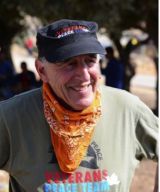 In spring 2002, Kenneth Mayers co-founded the Santa Fe chapter of Veterans for Peace, a global organization that relies on the voices and experiences of military veterans to advocate for peaceful solutions to conflicts. Last month, Mayers joined with other Veterans for Peace activists in the Palestinian village of Bi’lin to protest the constant tear-gas bombing of the village by Israeli Defense Forces.
In spring 2002, Kenneth Mayers co-founded the Santa Fe chapter of Veterans for Peace, a global organization that relies on the voices and experiences of military veterans to advocate for peaceful solutions to conflicts. Last month, Mayers joined with other Veterans for Peace activists in the Palestinian village of Bi’lin to protest the constant tear-gas bombing of the village by Israeli Defense Forces.
Kenneth Mayers had just finished digesting a tear-gas breakfast when he called The New Mexican from the Palestinian village of Bi’lin in mid-November to respond to the news that he has been chosen as one of the 10 Who Made a Difference. “I am honored,” he said by phone. “It doesn’t seem to me that what I am doing makes a difference. I hope it makes a difference.”
In Bi’lin, he joined with other Veterans for Peace activists to protest — in non-violent fashion, he stressed — the constant tear-gas bombing of the village by Israeli Defense Forces. “It happens at least once a week,” he said. “We have been here nine days, and every activist we have spoken to has said they are ready to live at peace with their neighbors if their neighbors are willing to stop the occupation” of Arab territories.
A quest for peace has driven Mayers — who was born in New York City 76 years ago — since he resigned his commission as an officer in the U.S. Marines late in 1966. He then attended the University of California at Berkeley to earn a doctorate in philosophy. He and his wife, Elizabeth, moved to Santa Fe 14 years ago; she died of cancer eight years ago.
In the spring of 2002, Mayers co-founded the Santa Fe chapter of Veterans for Peace. This global organization, which began in 1985, relies on the voices and experiences of military veterans to advocate for peaceful solutions to conflicts. It is Mayers’ dedication to Veterans for Peace and peace-related activism that garnered him nominations for the 10 Who Made a Difference this year. Among other achievements, Mayer’s nomination letters highlighted his local and national efforts to push for a nuclear freeze, end sexual assault in the military, break the Israeli blockade of Gaza in 2011, and conduct classroom visits with local students to talk about his experiences.
Those letters also mention Mayers’ numerous arrests. By his own count, he’s been hauled into the hoosegow for his activist efforts close to 20 times. “I haven’t been arrested in Santa Fe, but I may get arrested when the new legislative session starts,” he said, almost with a touch of pride in his voice. “I am so appalled that you can legally carry a loaded weapon into the state Capitol, but you are not allowed to carry protest signs in. I plan to gather up some others and march in with signs the day the session starts. We’ll see if that gets me arrested.”
A Santa Fe friend of Mayers asked him why he always looks so happy when he goes to jail. “Because I’m in the best of company,” he explained.
Santa Fe author Michael McGarrity, one of several people who nominated Mayers, said he has known him for 10 years. “He’s a remarkable man in many ways; a quiet guy,” McGarrity said. “He has that kind of leadership style that isn’t flashy — it’s just steady and organized and persistent. He’s a good man; a good man all around. He goes 100 miles an hour.”
His activist roots may have been planted as far back as the late 1930s and early 1940s, when he was still a child. He knows of 18 members of his German Jewish family who perished in the concentration camps during the Holocaust. “The lesson I took from that is, no one should ever be oppressed,” he said.
The proud father of two children (one lives in Vermont; the other in Colorado) and three grandchildren, Mayers likes to sing in the Santa Fe Symphony Chorus. He still works full time for The Appleton Group, which he said manages two professional networks — one for attorneys, the other for accountants.
What’s the best thing about being an activist? “There’s a chance — and I grant it’s a slim chance — that over time we will affect change,” he said. “I’ve been at this 45, 46, 47 years. I can’t say I’ve seen a helluva lot of progress. But I feel like I have to keep doing it.”

